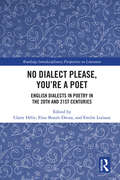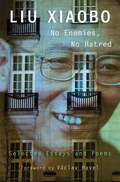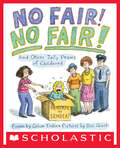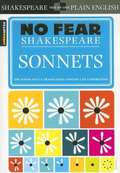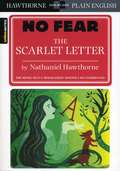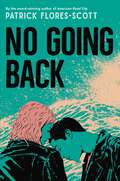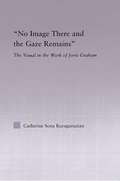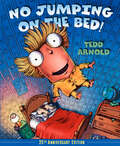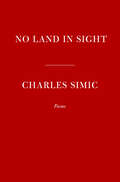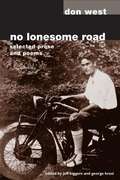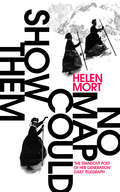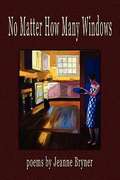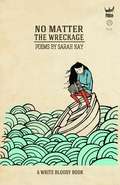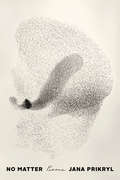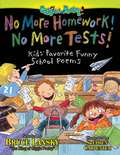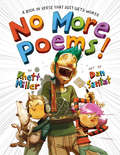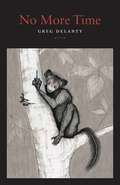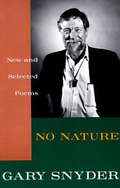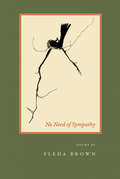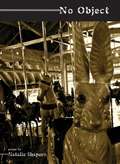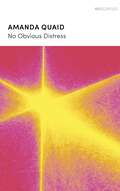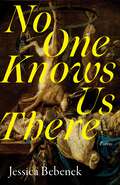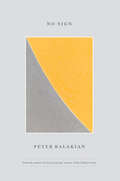- Table View
- List View
No Dialect Please, You're a Poet: English Dialect in Poetry in the 20th and 21st Centuries (Routledge Interdisciplinary Perspectives on Literature)
by Claire Hélie Elise Brault-Dreux Emilie LoriauxNo Dialect Please, You're a Poet is situated at the crossroads in research areas of literature and linguistics. This collection of essays brings to the forefront the many ways in which dialect is present in poetry and how it is realised in both written texts and oral performances. In examining works from a wide range of poets and poetries, from acclaimed poets to emerging ones, this book offers a comprehensive introduction to poetics of dialects from a variety of regions, across two centuries of English poetry.
No Enemies, No Hatred
by Liu XiaoboWhen the Nobel Peace Prize was awarded on December 10, 2010, its recipient, Liu Xiaobo, was in Jinzhou Prison, serving an eleven-year sentence for what Beijing called âeoeincitement to subvert state power. âe#157; In Oslo, actress Liv Ullmann read a long statement the activist had prepared for his 2009 trial. It read in part: âeoeI stand by the convictions I expressed in my âe~June Second Hunger Strike Declarationâe(tm) twenty years agoâe"I have no enemies and no hatred. None of the police who monitored, arrested, and interrogated me, none of the prosecutors who indicted me, and none of the judges who judged me are my enemies. âe#157; That statement is one of the pieces in this book, which includes writings spanning two decades, providing insight into all aspects of Chinese life. These works not only chronicle a leading dissidentâe(tm)s struggle against tyranny but enrich the record of universal longing for freedom and dignity. Liu speaks pragmatically, yet with deep-seated passion, about peasant land disputes, the Han Chinese in Tibet, child slavery, the CCPâe(tm)s Olympic strategy, the Internet in China, the contemporary craze for Confucius, and the Tiananmen massacre. Also presented are poems written for his wife, Liu Xia, public documents, and a foreword by Václav Havel. This collection is an aid to reflection for Western readers who might take for granted the values Liu has dedicated his life to achieving for his homeland.
No Fair! No Fair!: And Other Jolly Poems of Childhood
by Calvin TrillinThe first children's poetry collection by award-winning writer Calvin Trillin -- illustrated by acclaimed illustrator Roz Chast!Get ready to laugh out loud with Calvin Trillin's first collection of poems for children (and nearby grown-ups). Enjoy the whimsical cartoon illustrations by New York Times bestselling illustrator Roz Chast as you find out if Justin is "the awfulest kid in the class," if there's anything that Matt won't eat, and if you can send back a new baby brother.Inspired by some of Calvin Trillin's real-life experiences, No Fair! No Fair! And Other Jolly Poems of Childhoodcelebrates the humor of familiar everyday topics.
No Fear Shakespeare: Sonnets
by William Shakespeare John CrowtherNo Fear Shakespeare puts Shakespeare's language side-by-side with a facing-page translation into modern English-- the kind of English people actually speak today. When Shakespeare's words make your head spin, our translation will help you sort out what's happening, who's saying what, and why.
No Fear Shakespeare: The Canterbury Tales
by Geoffrey Chaucer John Crowther Josh Cracraft Hilary TeplitzHave you ever tried to read The Canterbury Tales but realized that you have to look up the definitions of half the words on the page? You want to enjoy Chaucer's poetry but decoding it one word at a time is beyond slow No Fear: The Canterbury Tales will fix that problem. When you can't decipher the original, look across to the right-hand page and you'll know what each word means and how they fit together. Soon you'll be reading Chaucer's own verse fearlessly--and actually enjoying it. No Fear: The Canterbury Tales puts Chaucer's language side by side with a facing-page modern English translation--the kind of English people actually speak today. When Chaucer's English makes your head spin, our translation will help you sort out what's happening, who's saying what, and why.
No Going Back
by Patrick Flores-ScottA Junior Library Guild Gold Standard Selection"Powerful…. The excellent pacing and heart-wrenching exploration of redemption will sweep readers up." —Kirkus Reviews"[A] page-turning, highly readable story." —Booklist"Time-stamped chapters add urgency, intensity, and excitement as the thrilling plot progresses, making for a page-turning story about forgiveness and personal evolution." —Publishers WeeklyIn this tour de force about one teen&’s quest for redemption from the award-winning author of American Road Trip, Antonio is determined to make amends to the people he hurt most—even if it means breaking the terms of his early release from juvenile detention. It&’s Friday morning, and seventeen-year-old Antonio Sullivan is on the verge of earning his early release from Zephyr Woods Youth Detention Center. Having been incarcerated for the last year and a half for a crime he didn&’t directly commit, he&’s now dedicating himself to his education and his sobriety program. What&’s more, Antonio is driven by a deep need to make amends to the two people he hurt the most: his mom and his lifelong best friend, Maya. The conditions of his early release are clear—Antonio can&’t have any contact with his father or miss his first meeting with his parole officer Monday morning. But a lot can happen between Friday and Monday, especially when the odds are against you. Told through time-stamped chapters that race at a fever pitch over the course of a weekend, this absorbing coming-of-age novel explores what it means to right past wrongs in the face of adversity.PRAISE FOR NO GOING BACK "Fast-paced, poignant, and poetic . . . This is a book of unexpected hope." —Sondra Soderborg, author of Sky Ropes "A deep look into the heart of being misunderstood, told with prose you just can't fake. With honest voices, a flow of poetry, and a satisfying conclusion, this book is a gift with a purpose, the kind you hand to a reader that both wants and needs it." —Sean Beaudoin, author of Welcome Thieves and Wise Young Fool "A gripping and heart-wrenching novel about family, friendship and second chances—will keep you on the edge of your seat until the very end." —Betty Culley, author of Three Things I Know are True and The Name She Gave Me "Poetry, resilience, unflinching honesty, a steady undercurrent of hope, plus a wild adventure with a ticking clock, this book packs it all in for a three-day turbulent ride that's full of heart." —Kristin Bartley Lenz, author of The Art of Holding On and Letting Go "A powerful story of the push and pull between doing what&’s right and being there for the people we love." —Katherine Higgs-Coulthard, author of Junkyard Dogs and Hanging with My Peeps "Patrick Flores-Scott delivers a beautiful exploration of familial love, the idea of healthy friendships, and the long-term impacts of trauma." —Rita Shah, author of The Meaning of Rehabilitation and Its Impact on Parole
No Image There and the Gaze Remains: The Visual in the Work of Jorie Graham (Studies in Major Literary Authors)
by Catherine KaraguezianFirst Published in 2006. Routledge is an imprint of Taylor & Francis, an informa company.
No Jumping on the Bed 25th Anniversary Edition
by Tedd ArnoldFully re-illustrated for its anniversary, this classic is funnier and more kid-appealing than ever In celebration of twenty-five gleeful years in print, Tedd Arnold has created all-new artwork in the zany style he is now known and loved for - the style of his other bestsellers Hi! Fly Guy and Parts.
No Land in Sight: Poems
by Charles SimicFrom one of America's most beloved poets, a piercing new collection reflecting on the characters and encounters that haunt us through this life and into the nextLeading us into a city stirring with gravediggers and beggars, lovers and dogs, Charles Simic returns with a brilliant collection full of his singular wit, dark humor, and tenderheartedness. In poems that are often as spare as they are monumental, he captures the fleeting moments of modern life—peering inside pawnshop windows, brushing shoulders with strangers on the street, and walking familiar cemetery rows—to uncover all the beauty and worry hiding in plain sight. As the poet reflects on a lifetime&’s worth of pleasure and loss, he recalls instances when he &“made excuses and hurried away,&” and considers the way memory always trails just behind. No Land in Sight is a testament to all we leave in our wake and, simultaneously, all we hang on to: the passing minutes, the evening&’s stillness, and the many lives we inhabit in dim thresholds and bright mornings alike.
No Lonesome Road: SELECTED PROSE AND POEMS
by Don West Jeff Biggers George BrosiThis is the first book to celebrate the life and writing of one of the most charismatic Southern leaders of the middle twentieth century, Don West (1906-1992). West was a poet, a pioneer advocate for civil rights, a preacher, a historian, a labor organizer, a folk-music revivalist, an essayist, and an organic farmer. He is perhaps best known as an educator, primarily as cofounder of the Highlander Folk School in Tennessee and founder of the Appalachian South Folklife Center in West Virginia. In his old age, West served as an elder statesman for his causes. No Lonesome Road allows Don West to speak for himself. It provides the most comprehensive collection of his poetry ever published, spanning five decades of his literary career. It also includes the first comprehensive and annotated collection of West's nonfiction essays, articles, letters, speeches, and stories, covering his role at the forefront of Southern and Appalachian history, and as a pioneer researcher and writer on the South's little-known legacy of radical activism. Drawing from both primary and secondary sources, including previously unknown documents, correspondence, interviews, FBI files, and newspaper clippings, the introduction by Jeff Biggers stands as the most thorough, insightful biographical sketch of Don West yet published in any form. The afterword by George Brosi is a stirring personal tribute to the contributions of West and also serves as a thoughtful reflection on the interactions between the radicals of the 1930s and the 1960s. The best possible introduction to his extraordinary life and work, this annotated selection of Don West's writings will be inspirational reading for anyone interested in Southern history, poetry, religion, or activism.
No Map Could Show Them
by Helen Mort* A Poetry Book Society Recommendation 2016*'When we climb aloneen cordée feminine,we are magicians of the Alps –we make the routes we followdisappear'The poems of Helen Mort's second collection offer an unforgettable perspective on the heights we scale and the distances we run, the routes we follow and the paths we make for ourselves.Here are odes to the women who dared to break new ground – from Miss Jemima Morrell, a young Victorian woman from Yorkshire who hiked the Swiss Peaks in her skirts and petticoats, to the modern British mountaineer Alison Hargreaves, who died descending from the summit of K2.Distinctive and courageous, these are poems of passion and precipices, of edges and extremes. No Map Could Show Them confirms Helen Mort’s position as one of the finest young poets at work today.
No Matter How Many Windows
by Jeanne BrynerThe stories of four generations of Women are documented in poems - both the horrors and delights of a family.
No Matter the Wreckage
by Sarah KayNo Matter the Wreckage presents readers with new and beloved poetry that showcases Kay's talent for celebrating family, love, travel, and unlikely romance between inanimate objects ("The Toothbrush to the Bicycle Tire"). Both fresh and wise, Kay's poetry allows readers to join her on the journey of discovering herself and the world around her.
No Matter: Poems
by Jana PrikrylAn urgent, visionary collection of poems from the author of The After Party “One of the most original voices of her generation.”—James Wood Jana Prikryl’s No Matter guides the reader through cities—remembered and imagined—toppling past the point of decline and fall. Conjured by voices alternately ardent, caustic, grieving, but always watchful, these soliloquies move from free verse through sonnets and invented forms, insisting that every demolition builds something new and unforeseen. In reactionary times, these poems say, we each have a responsibility to use our imagination. No Matter is an elegy for our ongoing moment, when what seemed permanent suddenly appears to be on the brink of disappearing.
No More Homework! No More Tests!: Kids' Favorite Funny School Poems (Giggle Poetry)
by Bruce Lansky Stephen CarpenterNo More Homework! No More Tests! includes the funniest poems about school ever collected in one book. <P><P> These hilarious poems were written by a number of poets, including Shel Silverstein, Jack Prelutsky, David L. Harrison, Colin McNaughton, Carol Diggory Shields, Kalli Dakos, and Bruce Lansky. Sillier than a teacher with hiccups, funnier than toilet paper stuck to the bottom of the principal's shoe, it is certain to have readers laughing by the first page. <P> This book puts the cool back in school and makes students WANT to write and read poetry. Appropriate for Grades 1-6, and Ages 5-12.
No More Poems!: A Book in Verse That Just Gets Worse
by Rhett MillerAcclaimed singer-songwriter Rhett Miller teams up with Caldecott Medalist and bestselling artist Dan Santat in a riotous collection of irreverent poems for modern families. In the tradition of Shel Silverstein, these poems bring a fresh new twist to the classic dilemmas of childhood as well as a perceptive eye to the foibles of modern family life. Full of clever wordplay and bright visual gags--and toilet humor to spare--these twenty-three rhyming poems make for an ideal read-aloud experience. Taking on the subjects of a bullying baseball coach and annoying little brothers with equally sly humor, renowned lyricist Rhett Miller's clever verses will have the whole family cackling.
No More Time
by Greg DelantyIn No More Time, Greg Delanty offers a celebration of the natural environment that also bemoans its mistreatment at the hands of humans. The collection’s long sequence, “A Field Guide to People,” is an alpha-bestiary of twenty-six sonnets, each a meditation on a species of flora or fauna that is thriving, endangered, or extinct. Evoking an earthly heaven, purgatory, and hell for plants and animals, these poems function also as love letters to the biosphere as they connect the past with the present in both form and content. In the middle of this sonnet sequence, a section labeled “Breaking News” gives voice in poetry to the political state of our planet with a balance of pathos, wit, and hope. Delanty stresses the deep underlying connections within and between the natural world and humankind, rather than the fragmented world stressed at the beginning of the twentieth century. No More Time witnesses the effects of climate change and presents a vital view of what remains at stake for engaged global citizens in the twenty-first century.
No Nature: New and Selected Poems
by Gary SnyderNo Nature marks the first collection from the whole of Snyder's work as a poet.
No Need of Sympathy
by Fleda BrownNo Need of Sympathy is an exceptionally wide-ranging poetry collection, touching on contemporary science, physics, family, politics, and the natures of poetry and reality. These poems, the eighth collection by Fleda Brown, ask huge questions; they zero in like a microscope on what's here, at hand. They are spoken with humility, great humor, curiosity, and a deep love of living.
No Need of Sympathy (American Poets Continuum)
by Fleda BrownNo Need of Sympathy is an exceptionally wide-ranging poetry collection, touching on contemporary science, physics, family, politics, and the natures of poetry and reality. These poems, the eighth collection by Fleda Brown, ask huge questions; they zero in like a microscope on what’s here, at hand. They are spoken with humility, great humor, curiosity, and a deep love of living.
No Object
by Natalie Shapero"It is unbefitting to believe in ghosts, to believe what one reads,/what one writes,"writes Natalie Shapero in her mischievous debut collection. With sharp wit and relentless questioning, Shapero crafts poems a reader can, if not believe in, then trust--to level with us, to surprise us, and to stay with us long after we put the book down. No Object is a fast ride you will not easily forget. "Shapero fastens you in a roller coaster car that creeps up a rickety hill, zooms into an abyss, then flips upside down to deliver you safely, wanting to take the ride all over again." --Denise Duhamel
No Obvious Distress: A John Murray Original
by Amanda Quaid'Striking, surprising, and technically excellent, the poems resonate way beyond their endings' Roger Robinson'Deft, daring, devastating and delightful' Pádraig Ó Tuama'Astonishing. These poems glimmer with a white-hot beauty that is hard won, and that sings' Sarah RuhlPatient is a normal appearing woman in no obvious distress.On an ordinary day, out with her three-year-old in the park, Amanda Quaid received a life-changing call - the back pain she had been living with for years was actually a rare and aggressive form of cancer. In an instant, life became a series of sterile rooms, medical charts and body-altering treatments which completely upend Amanda's marriage, work and family life as she knows it.Poetry became a lifeline for Amanda, a form to organize the chaos and pain of day-to-day life into order and beauty. In inventive and arresting poems that explore desire, marriage, motherhood and mortality, No Obvious Distress is a powerful memoir-in-verse about Amanda's unique experience. But it is also a tender, witty and universal collection that asks how we can continue to live and love in times of uncertainty.
No Obvious Distress: A John Murray Original
by Amanda Quaid'Striking, surprising, and technically excellent, the poems resonate way beyond their endings' Roger Robinson'Deft, daring, devastating and delightful' Pádraig Ó Tuama'Astonishing. These poems glimmer with a white-hot beauty that is hard won, and that sings' Sarah RuhlPatient is a normal appearing woman in no obvious distress.On an ordinary day, out with her three-year-old in the park, Amanda Quaid received a life-changing call - the back pain she had been living with for years was actually a rare and aggressive form of cancer. In an instant, life became a series of sterile rooms, medical charts and body-altering treatments which completely upend Amanda's marriage, work and family life as she knows it.Poetry became a lifeline for Amanda, a form to organize the chaos and pain of day-to-day life into order and beauty. In inventive and arresting poems that explore desire, marriage, motherhood and mortality, No Obvious Distress is a powerful memoir-in-verse about Amanda's unique experience. But it is also a tender, witty and universal collection that asks how we can continue to live and love in times of uncertainty.
No One Knows Us There
by Jessica BebenekFrom wherever I am, I willsend word like a golden thread,rolling an unravelling ball through time?towards myself.In this stunning debut collection, Bronwen Wallace Award finalist Jessica Bebenek presents two distinct and moving portraits of early womanhood. The first is that of the devoted, caregiving granddaughter navigating hospital hallways and the painful realities of palliative care. The second is that of a woman a decade older, compassionately looking back on her younger self, honouring unimaginable loss and turning it into genuine healing.All at once sensual, visceral, and dreamlike, No One Knows Us There takes us from the sterility of the hospital into the sumptuous natural world. We face horror in a manicured garden and discover beauty in the untamed woods. A theoretical mathematician leads us to an elk encounter, the crooked bodies of birds are found in the spring thaw, and we become our own pet snail in a mason jar.Ultimately, grief is radically transformed through plainspoken yet lyrical language, and this keen examination of trauma evolves into a striking celebration of the inevitability of change.
No Sign (Phoenix Poets)
by Peter BalakianNew poetry collection from Peter Balakian, author of Ozone Journal, winner of the Pulitzer Prize. In these poems, Peter Balakian wrestles with national and global cultural and political realities, including challenges for the human species amid planetary transmutation and the impact of mass violence on the self and culture. At the collection’s heart is “No Sign,” another in Balakian’s series of long-form poems, following “A-Train/Ziggurat/Elegy” and “Ozone Journal,” which appeared in his previous two collections. In this dialogical multi-sectioned poem, an estranged couple encounters each other, after years, on the cliffs of the New Jersey Palisades. The dialogue that ensues reveals the evolution of a kaleidoscopic memory spanning decades, reflecting on the geological history of Earth and the climate crisis, the film Hiroshima Mon Amour, the Vietnam War, a visionary encounter with the George Washington Bridge, and the enduring power of love.. Whether meditating on the sensuality of fruits and vegetables, the COVID-19 pandemic, the trauma and memory of the Armenian genocide, James Baldwin in France, or Arshile Gorky in New York City, Balakian’s layered, elliptical language, wired phrases, and shifting tempos engage both life’s harshness and beauty and define his inventive and distinctive style.
